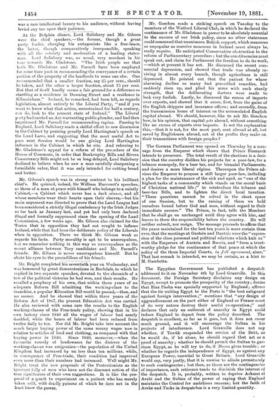Mr. Bright completed his seventieth year on Wednesday, and was
honoured by great demonstrations in Rochdale, to which he replied in two separate speeches, devoted to the chronicle of a iew of the political victories he had won, and their results. He recalled a prophecy of his own, that within three years of an adequate Reform Bill admitting the working-class to the franchise, a popular Education Bill would be passed,—then, and no sooner. And he showed that within three years of the Reform Act of 1867, the present Education Act was carried. He also reviewed with some care the results to the English working-classes of the Free-trade policy, showing that in his own factory since 1840 all the wages of labour had nearly doubled, while the hours of labour had been reduced from twelve daily to ten. Nor did Mr. Bright take into account the much larger buying power of the same money wages now in relation to articles of food and clothing, as compared with that buying power in 1840. Since 1840, moreover,—when the favourite remedy of landowners for the distress of the working-classes was emigration—the population of the United Kingdom had increased by s less than ten millions, while, in consequence of Free-trade, their condition had improved even more than their numbers had increased. Well might Mr. Bright treat the new proposals of the Protectionists as the ignorant fully of men who have not the dimmest notion pf. . the true significance of their own suggestions. It is like the pro- posal of a quack to experiment on a patient who has merely taken cold, with deadly poisons .of which he does not in the least know the it:wows






































 Previous page
Previous page